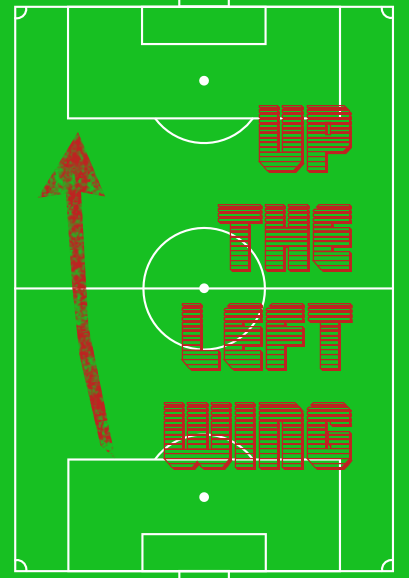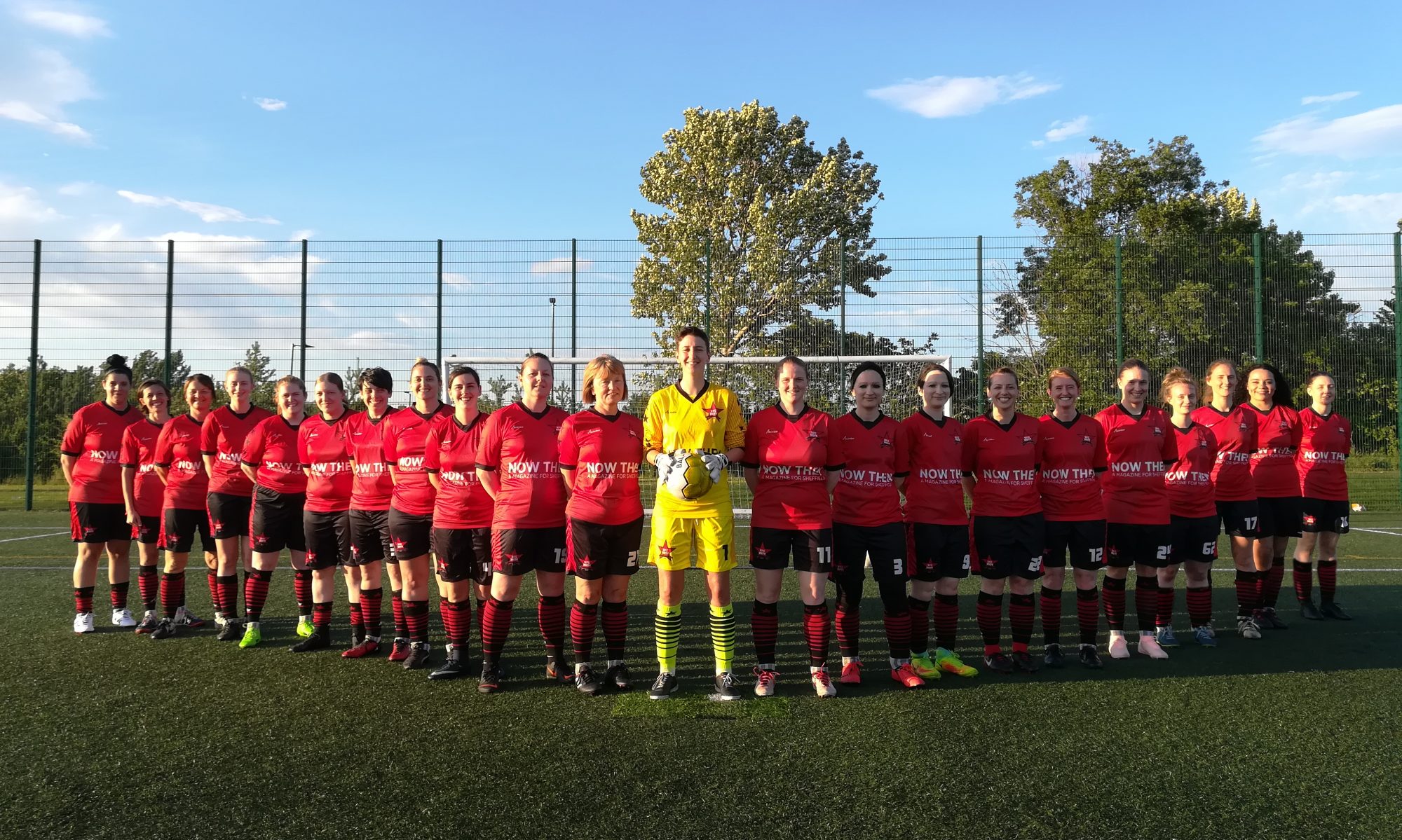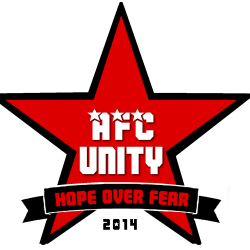by Jay Baker
I’m writing this one week after our incredible 3-2 upset over previously unbeaten Shaw Lane Aquaforce, who were at that point joint league leaders, in what was probably the best game of soccer I’ve ever witnessed in my life, because it had everything, from our opening goal one minute in, to going 1-2 down at half-time, to pulling equal, and finally clinching the winner five minutes from full time – you couldn’t have scripted a better fairy-tale, and a fine ending to our run of losses away from home which we knew didn’t reflect our quality, or the football we know we can force teams to engage in when on our home turf. But again, this season is about consolidation in the Second Division, as part of bigger plans for AFC Unity.
 Getting an organisation like ours off the ground in the grassroots game is always a challenge, and even more so when you’re anchored to your motto of ‘integrity’ and doing things the right way, rather than the easy way. Not everyone sees a football club as having a key part to play in its community, but for me that attitude is what’s allowed the sport to become dominated and damaged by profit, reducing it to a business, and disconnecting it completely from honest, decent working class people. That’s why we’re an alternative football club – and why we will keep our roots firmly in these areas.
Getting an organisation like ours off the ground in the grassroots game is always a challenge, and even more so when you’re anchored to your motto of ‘integrity’ and doing things the right way, rather than the easy way. Not everyone sees a football club as having a key part to play in its community, but for me that attitude is what’s allowed the sport to become dominated and damaged by profit, reducing it to a business, and disconnecting it completely from honest, decent working class people. That’s why we’re an alternative football club – and why we will keep our roots firmly in these areas.
The volunteering opportunities we provide exist as much to give back to the community as to help our organisation grow – such involvement is important for AFC Unity since our resources are limited, with no subsidies from a men’s team (when such clubs actually pass on any rewards reaped on to their women’s teams, which doesn’t always happen, by the way – they’re often treated like tokens to make money from). Every volunteer we take on has a goal in mind for how their own prospects can be improved by participating with us, and it just so happens that we have had top-notch volunteers such as the passionate Anna Pickering focused on sports psychology, knowledgeable Jarrod Skervin in sports physio, and sports journalist Finola Fitzpatrick, who’s been an absolute force of nature for us and really raised the profile of our Football for Food campaign.
The Football for Food campaign was originally my co-founder Jane Watkinson’s idea, as a simple bread-and-butter issue AFC Unity could tackle in a pragmatic way – dealing with food poverty in our city via our collaboration with Sheffield Food Collective and the backing of our sponsors, Nourish. It’s another reminder that, in the grand scheme of things, football isn’t the be-all, end-all, and should only exist because of community, not in spite of it. We’re here for what good we can do socially – and the more successful we become on the pitch, the more effective we’ll be at doing some good.
Probably the biggest supporters of the AFC Unity concept since day one have been South Yorkshire Sport who, more than any other organisation, have helped us avoid the collapse so many women’s teams succumb to, whether associated with a men’s side or not. No one has done so much to get behind the good we’ve tried to do, or to make sure we’ve kept going when we’ve felt browbeaten. Stuart Rogers, in particular, has been a guardian angel for AFC Unity, and I don’t mind saying it, and it was our director Anna Cordwell who first put us on to South Yorkshire Sport so we could connect with him. One thing he said recently was, ‘AFC Unity are developing good people, not just good players.’ One of his colleagues then backed up that statement by suggesting that this was essentially the USP of AFC Unity.
My dad – a former grassroots player and referee – always said that soccer tends to attract ‘really unintelligent, thick people’ at the top. And it’s true, because who in heaven’s name would want to take on a job as a player, contributing nothing at all to society than kicking a ball around a piece of grass? People do this stuff as a hobby; heck, our players actually pay to play! No, football should be about enjoyment, about covering costs and giving back to the community, and our players value that. Good people, not just good players.

I see so many misogynistic managers who just don’t get women’s soccer, and instead use their teams as an opportunity to vent their frustrations after a long week, and regain some sense of power, and that aggressive attitude is reflected in turn by their players swearing, shouting and cheating on the pitch. I happen to feel like I have enough responsibilities in my working week without grasping for more power on a Sunday, or at training on Monday – you can’t have rights without responsibilities, and ultimately it’s the manager’s duty to take the flak when things go wrong (since he or she is coaching the players), but take the credit for when things go right? I don’t think so. I don’t see how that helps women’s football or how any manager can lead a women’s team without being a feminist. It’s about empowering these women, simply guiding them, but letting them enjoy their football and showing that it’s them – not some man – that are enacting plans on the pitch. It’s their game. They’ve stood in the shadow of men long enough, thanks, without me getting in there and making it about me. That is not why I do this.
The coaching approach I take is designed to reflect all this as well, and it’s one I’m happy to share, because I’d like to see it emulated more by those secure enough to take coaching tips from a lowly Level 1 like myself who isn’t one of those at the top, but comes instead from the bottom – the community sector:
- Give good feedback but don’t single players out for heaps of praise; tell them aside on an individual level
- Don’t pick out a ‘player of the match’; no one player ever has a good game without good players around them working hard as part of that team – collectivism, not individualism
- If players all want to pick out a player they felt had a great game, encourage them to go and tell that player themselves; it’s an important part of the social aspect of a football team, too!
- Call them training exercises, not ‘drills’; it’s football, not an army camp!
- Use training exercises (!) that are simple to explain, and understand – and make sure players know why they’re doing them
- Players can’t gain fitness through one-off sessions of off-the-ball action, they gain football fitness just by playing soccer regularly – the more time they have on the ball, the better, as each second counts in on-the-ball training and has a great effect on the player’s confidence
- Never, ever, get on the ball yourself – of course, if you’re like me, you miss playing and love to play, but don’t: for every touch you have on the ball, that’s one a player could have had, and developing them is more important than you wanting a kick-about
- Don’t talk too much – words are better in quality not quantity; they came to play and have fun, not listen to you show off how much you know about the game, so instead throw it out to them for their feedback too, since they’re the ones out there in the thick of it, not you!
- Stamp out cliques at all costs – obviously, friendships are formed, and players have some things in common with some more than others, but when they play, they play as a team, and they’re there because they want to play for that badge
- Keep boundaries in place: you’re their coach, but you have to get the balance right between being friendly and keeping a professional distance (and you should never look like you have favourites when you’re in coaching mode)
- Keep all criticism constructive, i.e., ‘Try and remember to do what you usually do best; you haven’t done that as much today’ and ask them why – 100% positivity, no negativity whatsoever (it’s really not such a crazy idea)
- Don’t encourage, accept, or allow cheating of any kind, ever, even if the opponents are doing it: if you play good football, you’ll win anyway – let the others cheat and try and sleep at night, since you’re a winner anyway if you always do the right thing
I’ll leave it there for now, but I thought I’d throw out there how our coaching approach is designed to reflect our ethos, and how in turn this way of doing things gets the ethos reflected by the players. It’s not for everyone, I know – some prefer screaming, shouting, intimidating, and see football as war, and to be fair, for some it might as well be since their jobs depend on it in big clubs. But I prefer hope over fear – football is just a part of society, and society needs a little more of that, don’t you agree?

